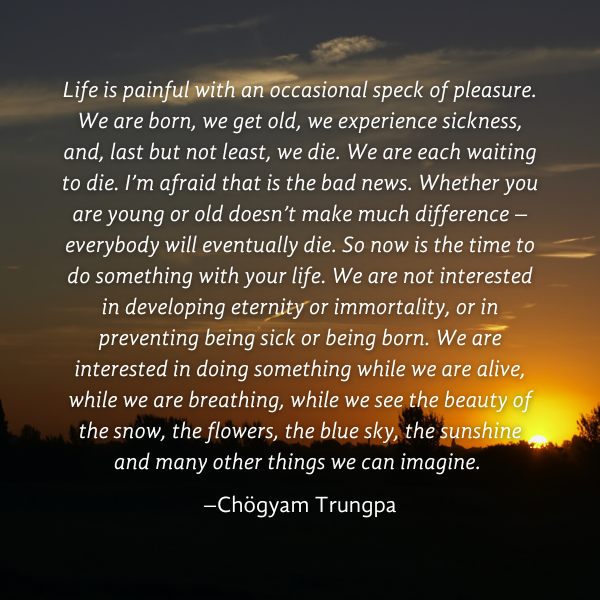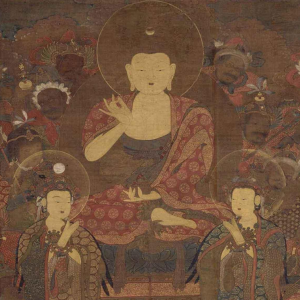Thursday
Dying & Death Classes on Shambhala Online
By Alley Smith

Death is the greatest of all teachers. –The Buddha
Shambhala Online has been offering a variety of courses on topics related to dying and death. These topics enable the sangha and outside community members to gather and think about death, engage in contemplative practices, and toil with topics such as fear, anxiety, the unknown, and how to have conversations about death.
The Shambhala community is gathering with purpose: to understand the dying process, to recognize and articulate the role of spiritual, religious and existential support, practices, and cultural norms within the modern Buddhist context. The result is tremendous openness and courage to face the inevitable and unknown in a gentle and relaxed way.
As Chögyam Trungpa Rinpoche says, Life is painful with an occasional speck of pleasure. We are born, we get old, we experience sickness, and, last but not least, we die. We are each waiting to die. I’m afraid that is the bad news. Whether you are young or old doesn’t make much difference – everybody will eventually die. So now is the time to do something with your life. We are not interested in developing eternity or immortality, or in preventing being sick or being born. We are interested in doing something while we are alive, while we are breathing, while we see the beauty of the snow, the flowers, the blue sky, the sunshine and many other things we can imagine.
While we are alive we can explore our personal belief systems about dying and death, our struggles, vulnerabilities, strong emotions, personal values, needs, and much more. Death has so much to teach us. Even as the Buddha was dying, he taught that suffering (dukkha) comes from not living in accordance with the truth of impermanence and interdependence. Death itself is a profound spiritual transmission.
Students have been gathering across the global community at Shambhala centers in Seattle, Dallas, Halifax, Los Angeles, and Philadelphia to offer support and practice advice. Communities are interested and invested in doing something while they are alive, while breathing, to be embraced by the sangha, to be met with unconditional kindness and the warmth of the Great Eastern Sun.
In the end, everything is left up to the individual. Therefore, most Buddhists do not take the truth of impermanence half-heartedly. Whether we are studying the Tibetan Book of the Dead, teachings of Amitabha Buddha, the Pure Lands, Sukhavati, Bodhichitta, the Bardos, and a vast array of teachings, we must do as many great Rinpoches and Tibetan lamas suggest. Engage in whichever practices are clearest, familiar, and most vivid on our deathbeds.
While we are alive we must be willing to face old age, sickness, and death with confidence and fearlessness. We must abandon any notion of resentment and attachment. Ask yourself, why would the Buddha say, Death is the greatest of all teachers? What can we learn from his words? In the end, as Trungpa Rinpoche says, “It’s up to you sweetheart.”
Shambhala Online would like to invite you to attend any one of these upcoming sessions in 2025:
Fear & Fearlessness: Navigating Life & Loss
March 27. During this online session, we will explore Chögyam Trungpa Rinpoche’s teachings on “Fear and Fearlessness” from the timeless classic, Shambhala: The Sacred Path of the Warrior.
The Buddha’s Discourse on Teachings to Be Given to the Sick
November 1. During this mini-retreat, we will read and explore the Buddha’s Discourse on the Teachings to Be Given to the Sick. We will examine traditional Buddhist teachings on the six senses, six sense objects, six elements, the five aggregates, and more.
Making Friends with Death & Dying: Support Group (1st Monday night of every month)
Next session April 7. Support group sessions will include a short talk, meditation practice, and an open forum to discuss personal experiences with old age, sickness, death, grief and bereavement. All are welcome. We respect your privacy. These sessions will not be recorded.
The 49 Day Ceremony: A Celebration of Life & Death
December 13. Join Chaplain Alley Smith for a 3-hour online mini-retreat as she guides participants into a deeper understanding of the 49 Day Ceremony and the common Buddhist practices and rituals that follow someone’s death – all within a modern Buddhist context.
Alley Smith (she/her) is an ordained Zen Buddhist Chaplain, scholar, researcher, and lecturer who serves at a college and university. Alley is deeply influenced by Pure Land Buddhism and Vajrayana. She has been a member of Shambhala and Zen since 1999. Alley works in the funeral industry in Vermont. She teaches a number of courses on Shambhala Online.
Entries filed under Dharma Teachings
The View of the Sangha – HIGHLIGHT
By Gaylon Ferguson We are human beings walking a path of liberation, and the value of community is linked to our fundamental humanity. As Suzuki Roshi said, “Buddhanature is just another name for our human nature.” As human beings, we are strongly affected by those ... continuePosted March 19, 2010 by Jennifer Holder
Never Give Up – HIGHLIGHT
From the column Dharma Snacks, by Cynthia Kneen Takeda Shingen was a great warrior who lived in sixteenth century Japan. He gave a very famous teaching to warriors under his leadership. He said they should develop their minds to be fu rin ka zan. Kanjuro Shibata XX ... continuePosted March 17, 2010 by
Creating Peace the Shambhala Way – HIGHLIGHT
By Sakyong Mipham It is absolutely possible to create a good human society here on earth. To do so, we need strong mindfulness and intention. As human beings, we are influenced by our environment. If we create an environment of aggression and disharmony, stress will become the ... continuePosted March 5, 2010 by
When Concept Opens Up – HIGHLIGHT
From the column Dharma Snacks, by Cynthia Kneen I find contemplation powerful. When a concept opens up, we find a meaning that is deeper and richer than the intellectual activity we started with. As the mind softens and appreciates, we gain insight into the nature of what ... continuePosted March 2, 2010 by
Announcing “Stars of Wisdom” – HIGHLIGHT
Stars of Wisdom: Analytical Meditation, Songs of Yogic Joy, and Prayers of Aspiration by Khenpo Tsultrim Gyamtso Translated by Ari Goldfield, Rose Taylor Foreword by H. H. the Dalai Lama, The XVII Karmapa From Shambhala Publications: The Tibetan Buddhist teacher who’s known for his joyous, spontaneous songs of realization presents the teachings ... continuePosted February 12, 2010 by
How to Work with Obstacles – HIGHLIGHT
By Sakyong Mipham Whatever our level of practice, there will always be obstacles. The Tibetan word for obstacle, parche, means “what cuts our progress.” In fact, sometimes the more we are engaged in practice, the greater the obstacles become. If we understand that obstacles are part of ... continuePosted February 7, 2010 by
Diving Deep – HIGHLIGHT
From the column Dharma Snacks by Cynthia Kneen I grew up in the Midwestern United States, from sturdy Canadian stock. Somehow my parents thought that Californians were a little silly, and to me that meant that an activity like whale watching was probably silly, too. Then I ... continuePosted January 21, 2010 by
Shambhala Warriorship and Meditation – HIGHLIGHT
By Sakyong Mipham In one of the most beautiful Buddhist poems ever written, the great Indian teacher Shantideva talks about the bodhisattva warrior. The Tibetan term is changchup sempa, “the warrior with the mind of enlightenment.” Such a warrior dedicates his or her life to others, using ... continuePosted January 17, 2010 by Jennifer Holder
Weekly Videodhara – HIGHLIGHT
Infusing the Presence of Chogyam Trungpa into Your Curriculum Complied by Jennifer Holder, with Carolyn Rose Gimian, Gordon Kidd, and Denny Blouin contributing. The Videodhara By Denny Blouin Forget the mahasiddha for the west business: Just CTR in b & w and color, speaking. In your face, your brain, your blood Mainline direct, ... continuePosted January 8, 2010 by Jennifer Holder
Seven Riches of a Sakyong – HIGHLIGHT
The Seven Riches of the Sakyong are traditional, universal and practical contemplations on how we can handle ourselves. They were introduced to the community by the Druk Sakyong (Chogyam Trungpa Rinpoche) at the 1978 Kalapa Assembly. The accompanying photos are of rupas given to the Druk ... continuePosted December 31, 2009 by David_Brown
Making Room in Your Meditation Room – HIGHLIGHT
The Zen Novice finished his first meal at the monastery. Anxious to begin his journey to enlightenment he asked his Master “Now What?” The Master replied, “Now wash your bowl.” —-Zen Parable By Acharya Michael Greenleaf Michael, Can We Talk? Michael, my dear, we have to talk. No, I ... continuePosted December 30, 2009 by michaelgreenleaf
Knowing Love – HIGHLIGHT
From the column Dharma Snacks by Cynthia Kneen I’ve been thinking about love. Rumi, the Sufi poet, says of love, “Sea water begs the pearl to break its shell.” In a different context, the Druk Sakyong, Trungpa Rinpoche, said, “The dralas are eager to fall in love ... continuePosted December 25, 2009 by
Universal Responsibility and the Climate Emergency – HIGHLIGHT
By His Holiness, the Dalai Lama, who was the first to sign the Buddhist Declaration on Climate Change It is difficult to fully comprehend great environmental changes like global warming. We know that carbon dioxide levels are rising dangerously in the atmosphere leading to unprecedented ... continuePosted December 5, 2009 by Jennifer Holder
“It Works If You Work It” – HIGHLIGHT
What we can learn from the discipline of people whose lives are on the line. By Bindu Wiles I have been getting up at 5:30 am to get to my desk by 5:40. I have never been a morning person — I seem to do my ... continuePosted November 29, 2009 by Jennifer Holder
Picasso’s Picassos – HIGHLIGHT
From the column Dharma Snacks by Cynthia Kneen There is a story about a collection of paintings by Picasso that Picasso kept for himself. One of them is very small, only 7 ¼ by 5 ½ inches. It is a very dark oil painting with a figure ... continuePosted November 22, 2009 by
![]() RSS feed for the Dharma Teachings category
RSS feed for the Dharma Teachings category
View all posts from authors in Dharma Teachings: jillian_johnson

















